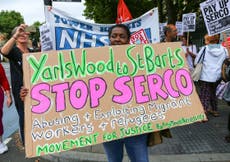Everything you thought you knew about UK immigration is wrong
In the first piece of a new series, Minnie Rahman explains why we shouldn’t be afraid to stand up for migrants’ rights by telling the truth. And there’s no better time to do so than right now


Myths around migration are so common that it’s difficult to tell where reality ends and the truth begins. Politicians from across the spectrum still claim that those with “legitimate concerns” have not had their voices heard, despite the fact that misconceptions around migration are predominant in the media, and that statistics show time and again that people come to the UK for a range of reasons.
Rarely does the public understand what moving to the UK is like. But every day, people’s lives, families and communities are torn apart by a tangled mess of rules, a chaotic Home Office and a hostile environment – and these are the voices we rarely hear.
The simple truth about migration is that people move. They always have and always will. But at a time when immigration reform is high on the government’s agenda, it’s vital that we challenge the myths that are so prevalent in our discourse. After Brexit, our new migration system must be based on evidence, not cynical scapegoating.
“Migrants steal jobs and bring down wages”
We hear almost daily that migrants threaten British jobs, and that migrant workers lead to a drop in wages for British workers. In reality, there is no evidence that migration drives down wages, particularly for the working class. Migrants themselves are disproportionately represented in low-wage sectors and research from the University College London has found that migration can actually lead to an increase in the wages of higher-paid workers. A recent government-commissioned report by the Migration Advisory Committee found that it is international financial forces, not migration, that impacts salaries, with all workers having done badly since the financial crisis of 2008. Real wages are still struggling to rise above where they were in the aftermath of that crisis and in many cases, migrant workers are actually leading the battle to ensure that standards rise for all workers.
“The new points-based system rightly rewards migrants based on merit”
The government claims that its new “points-based” migration system, introduced through the recently announced immigration bill, will “attract high-skilled workers”. But the proposals actually amount to a two-tier system which makes judgements on income, treats people as economic commodities and makes it impossible for anyone to live in the UK unless they are rich or have a PhD.
By the government’s definition of “skilled”, most of us in the country are unskilled. Take the fact that more than one in five workers in the care sector were born outside the UK, or that on average, carers earn less than £18,000. These are the people who spend their days looking after people in their hour of greatest need, a hugely emotionally and physically demanding job – yet they fall far below the salary threshold the government has set at £25,600. The proposals do nothing but make businesses and industry insecure, and risks decimating the NHS.
“Migrants abuse the welfare system”
In the same breath, people who perpetuate the false notion that migrants drive down wages often also claim that migrants are abusing our welfare system. Memes and viral Facebook posts often claim that “illegal” immigrants are always “first in the queue” for housing, benefits and are a drain on the NHS. But this couldn’t be further from the truth. As shown by the latest report from the Office for National Statistics on immigration, it’s students who make up around half of all non-EU immigration and the majority of EU nationals predominantly arrive to work.
Health tourism is almost non-existent, with the NHS spending more on stationery than on treating people who aren’t eligible for NHS care. The government’s own estimate puts the cost of deliberate misuse of the NHS by overseas visitors at 0.3 per cent of the NHS budget – the majority of this is actually British expats living overseas, who are not “ordinarily resident” in the UK and return to the UK solely to use the NHS outside of the rules.
Migrants of all kinds do pay for NHS services and have done for many years. The Immigration Health Surcharge, which is included as part of visa applications, means that migrants actually pay for the NHS twice over – £1,000 a year as part of their visa application, and then payments through their tax contributions.
In fact, most people who come to live in the UK have “no recourse to public funds”, meaning they are not eligible for benefits. Even asylum-seekers, who are barred from working, are left to live on just £5.39 per day, and struggle to support themselves and their families. What’s more, the “hostile environment” denies anyone without documentation the right to benefits, banking, driving licences and employment.
“The immigration system helps vulnerable, trafficked women”
Under current rules, anyone without documentation faces arrest or indefinite detention. When such people are trafficked and abused by employers, this means they fear coming forward to the police. The criminalisation of migration means that victims of trafficking, migrant workers and survivors of domestic abuse fear going to the police in case they’re reported to immigration enforcement. Abusers are also able to hold on to vital documentation and use it as a means to further exploit and control their victims. There is a fundamental clash within the Home Office. The same agency that is meant to protect victims of trafficking also seeks, in many cases, to remove them from the country.
“The UK has a soft border”
The UK’s border itself is the source of one of the most pernicious myths about migration. Anti-migrant groups claim that the border is “soft” or “porous”. In fact, the UK already has extremely restrictive and draconian border controls, highlighted most clearly with the tragic case of the Essex 39. If we truly had a “soft” border, then people would not be risking their lives trying to cross the Channel in order to get here. The lack of safe and legal routes of entry into the UK ensures that those who are desperate will be pushed to extreme methods of entry. Far from being soft, our hard border regime already means that many people die on entry to the UK, or are left to the hands of those willing to exploit them.
We shouldn’t be afraid to stand up for migrants’ rights by telling the truth. The truth about migration is that those in power have failed to make the case for migrants’ rights, and have instead pandered to anti-migrant narratives. Migrants are far more than their economic contributions and are not responsible for destructive policies designed to crack down on public spending. Britain can be a place where people don’t suffer just because they move, where policy is grounded in evidence and the public are brought on board – we just have to be brave enough to ask for it.
Minnie Rahman is a writer, speaker and public affairs and campaigns manager at the Joint Council for the Welfare of Immigrants






Join our commenting forum
Join thought-provoking conversations, follow other Independent readers and see their replies